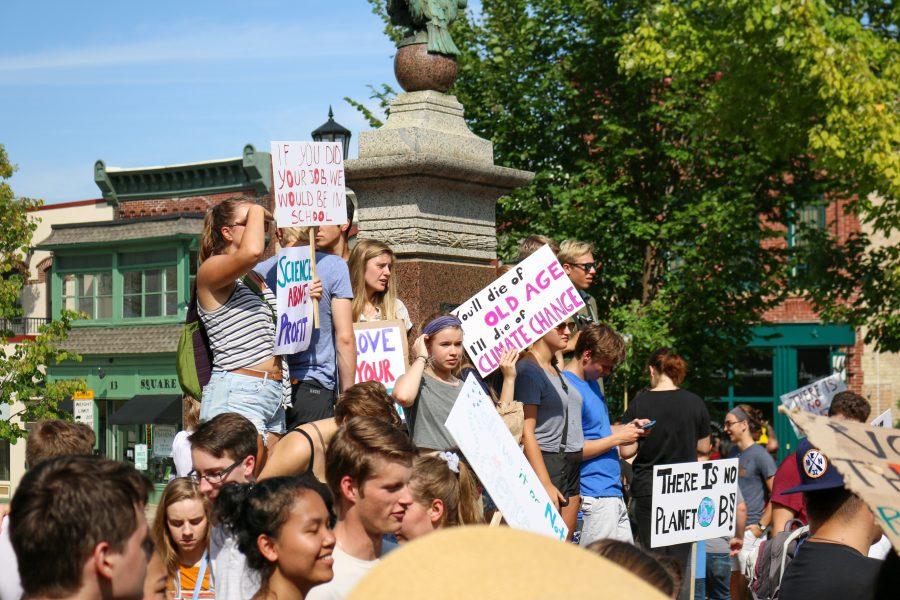Earth is in the midst of a climate crisis. In July of this year, several higher education networks concerned with sustainability recognized this crisis by declaring a climate emergency. Carleton indirectly supported this emergency declaration as a member of Second Nature, a network of about 600 colleges and universities.
The organizations declaring a climate emergency simultaneously published a Climate Emergency Letter that they planned to give to government officials and the media before the UN Secretary General’s Climate Summit in September. The organizations called on other networks and educational institutions around the world to join with them in signing the letter.
So far, despite appeals from dozens of alumni, President Poskanzer has refused to sign Carleton onto the emergency letter individually. We believe that signing the letter directly is important to reaffirm Carleton’s commitment to taking emergency action and to emphasize its awareness that climate change poses a threat to Carleton students. See the email to President Poskanzer and his response at https://divestcarleton.com/updates/.
But signing the letter is just the first step. We face a climate emergency, and Carleton’s response to date does not reflect that reality. Significant new action is required.
1. Move up the carbon neutrality date
Carleton has committed to achieving carbon neutrality by 2050. In order to achieve this goal, it issued a Climate Action Plan in 2011. We commend the College on developing this plan, but considering recent advances in green technology and the ever-accelerating pace of climate change, a 2050 deadline is no longer soon enough. The earth and its inhabitants cannot wait that long for institutions like Carleton to cease using fossil fuels.
Many peer institutions have committed to an earlier date for neutrality, according to the Second Nature network. Fellow Midwestern liberal arts colleges Kenyon, Macalester, and Oberlin have committed to carbon neutrality by 2040, 2025, and 2025 respectively. The schools sharing our U.S. News #5 ranking (Pomona, Bowdoin, and Middlebury) have also dedicated themselves to earlier deadlines (2030, 2020, and 2016). Carleton should join its peer institutions in committing to a more aggressive goal.
2. Intensify moves toward sustainability
The Association for the Advancement of Sustainability in Higher Education (AASHE) publishes an assessment of sustainability efforts, rating performance on a wide range of campus actions, including energy, food, curriculum, public engagement, buildings, etc. In the most recent report, Carleton was categorized as a “Silver” with an overall score of 54 points. Stanford topped the list with a Platinum grade of 88. Some of Carleton’s peer institutions significantly outperformed Carleton. Gold status was achieved by Colby (83), Middlebury (78), Oberlin (73), Bowdoin (69), and Macalester (67).
This disappointing performance is also recognized in the Sierra Club’s most recent “Cool Schools” report, which is based in part on the AASHE data. The Sierra ranking places somewhat more weight on energy, air and climate, transportation, and public engagement, reflective of the Club’s priorities. In the 2019 rankings, Carleton placed at position 159, badly trailing many of its peer institutions. Despite good intentions and the hard work of the Sustainability Office, meaningful action is clearly not a serious priority for the administration. The College with all of its resources can do better.
3. Commit to divest from fossil fuel companies.
Finally, while Carleton has taken some good steps toward sustainability goals with its on-campus resources, it has completely ignored a major tool of the institution: its endowment portfolio. Many investment companies are now calculating the carbon footprints of their portfolios. Carbon-heavy investments such as fossil fuel companies increase Carleton’s carbon footprint by directing its resources toward the support of CO2 emissions. Investing instead in sustainable industries would direct Carleton’s resources toward CO2 reduction and a sustainable economy. Divestment would also target the fossil fuel industry’s social license to continue using its considerable financial heft to impact elections and policy discussion, further slowing progress to a low carbon future.
Practically, divestment makes good financial sense. If, as laid out in the Paris Agreement, we are to limit global warming to 2 degrees Celsius, we must leave a large percentage of the remaining oil and gas reserves unburned. This means that fossil fuel companies that have not greatly expanded their business portfolios will be left with unusable, stranded assets and diminishing business prospects. When the University of California system announced just last week that it would divest its $13 billion endowment and $70 billion pension from fossil fuels, its CIO and Investment Committee Chair stated: “We believe hanging onto fossil fuel assets is a financial risk.”
It is time for Carleton to realize that the responsible thing to do—both environmentally and financially—is to rapidly divest its fossil fuel stocks. Worldwide, 1118 institutions with managed assets of $11.48 trillion have already divested. There is wide support for joining them in the Carleton community. Half the student population, as of 2017, signed a petition requesting that Carleton divest from fossil fuels. Over 70 faculty members did as well, and so far there are 1558 names, including 1463 living alumni, on the alumni Divest Carleton petition. You can find more information about Divest Carleton at divestcarleton.com and on the Divest Carleton student and alumni Facebook pages.
With each passing day, the severe consequences of ignoring climate change are less and less in dispute. Around the world, our peer colleges and many other institutions are stepping up to address the climate crisis. We Carls, concerned about the future of the next generations of students, believe that our College should do the same.
Patrick Dunlevy ’72
Brett Smith ’64
Rebecca Hahn ’09
Amelia Blair-Smith ’21
Karen Chen, ’21
Wendy Erickson, ’21
Maria Fairchild, ’20
Caroline Hall, ’20
Jared Kannel, ’20
Laura Kiernan, ’20
Alex Kucich, ’21
August Lindgren-Ruby, ’20
John Sherer, ’21
Tuomas Sivula, ’21
Taylor Yeracaris, ’20












